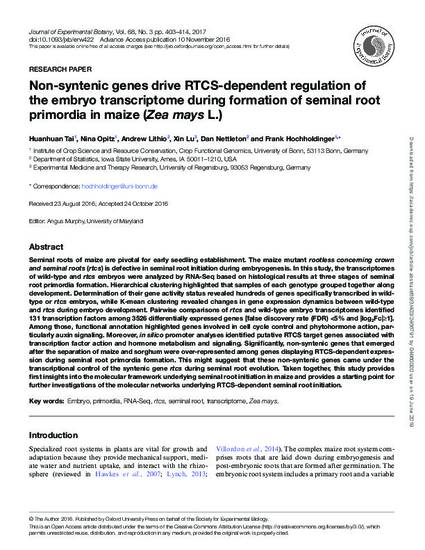
Seminal roots of maize are pivotal for early seedling establishment. The maize mutant rootless concerning crown and seminal roots (rtcs) is defective in seminal root initiation during embryogenesis. In this study, the transcriptomes of wild-type and rtcs embryos were analyzed by RNA-Seq based on histological results at three stages of seminal root primordia formation. Hierarchical clustering highlighted that samples of each genotype grouped together along development. Determination of their gene activity status revealed hundreds of genes specifically transcribed in wild-type or rtcs embryos, while K-mean clustering revealed changes in gene expression dynamics between wild-type and rtcs during embryo development. Pairwise comparisons of rtcs and wild-type embryo transcriptomes identified 131 transcription factors among 3526 differentially expressed genes [false discovery rate (FDR) <5% and |log2Fc|≥1]. Among those, functional annotation highlighted genes involved in cell cycle control and phytohormone action, particularly auxin signaling. Moreover, in silico promoter analyses identified putative RTCS target genes associated with transcription factor action and hormone metabolism and signaling. Significantly, non-syntenic genes that emerged after the separation of maize and sorghum were over-represented among genes displaying RTCS-dependent expression during seminal root primordia formation. This might suggest that these non-syntenic genes came under the transcriptional control of the syntenic gene rtcs during seminal root evolution. Taken together, this study provides first insights into the molecular framework underlying seminal root initiation in maize and provides a starting point for further investigations of the molecular networks underlying RTCS-dependent seminal root initiation.
Available at: http://works.bepress.com/dan-nettleton/51/

This article is published as Tai, Huanhuan, Nina Opitz, Andrew Lithio, Xin Lu, Dan Nettleton, and Frank Hochholdinger. "Non-syntenic genes drive RTCS-dependent regulation of the embryo transcriptome during formation of seminal root primordia in maize (Zea mays L.)." Journal of experimental botany 68, no. 3 (2016): 403-414. doi: 10.1093/jxb/erw422.